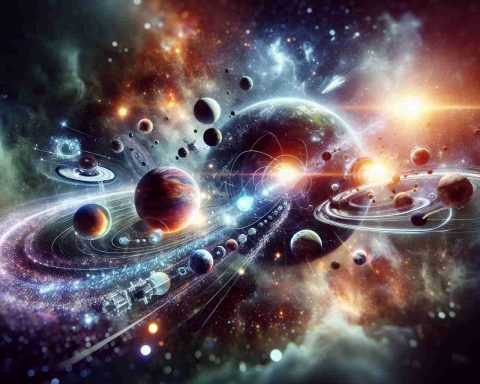- Microbes are being explored as potential allies in protecting astronauts’ health during space exploration.
- Space poses significant challenges to astronaut health, including microgravity, radiation, and isolation.
- ISS crew members face health issues attributed to decreased microbial diversity in the space environment.
- Introducing Earth-derived beneficial microbes into space habitats could enhance astronaut resilience.
- Microbes have long been part of human biology, aiding infection defense and overall health maintenance.
- Risks include the potential for microbes to mutate under space conditions, necessitating careful control.
- This innovative approach could revolutionize space medicine, aiding long-term human colonization efforts on other planets.
Imagine a world where tiny, invisible helpers could be the unsung heroes of space exploration, protecting astronauts as humanity reaches for the stars. In the cosmic quest to explore the Moon, Mars, and beyond, scientists are turning to an unexpected ally: microbes. As astronauts venture into the unforgiving realms of space, they face the silent assaults of microgravity, rampant radiation, and isolating confinement, all of which subtly erode their immune defenses.
Venture aboard the International Space Station (ISS) and you’ll find astronauts grappling with perplexing health issues—relentless rashes, persistent cold sores, and newfound allergies. These troubling symptoms underscore the pressing need for innovative solutions to safeguard astronaut well-being on increasingly ambitious missions.
In an exciting twist, recent research reveals that the ancient companions of humankind—soil and water microbes—could fortify astronaut health against space’s harsh conditions. At the heart of this groundbreaking study, scientists discovered that the ISS, despite its pristine design, suffers from a stark loss of microbial diversity, resembling super-sanitized environments here on Earth. Paradoxically, this sterility might not be the bastion of safety once believed.
By reintroducing Earth-derived beneficial microbes into space habitats, astronauts could leverage these microscopic allies to bolster their resilience. Microbes play an integral role in our biology, having evolved alongside us to aid in fighting infections and maintaining robust health.
However, the venture to introduce beneficial microbes into the cosmos isn’t without peril. Space’s unique environment might coax microbes into unexpected behaviors, potentially transforming benign strains into aggressive ones. Thus, the challenge lies in ensuring that these microbial allies remain safe and effective amidst the oddities of space.
If this counterintuitive strategy proves successful, it could herald a paradigm shift in space medicine—enabling astronauts to thrive on distant planets. The quest for space colonization may very well hinge on the invisible entities we’ve coexisted with for millennia. As we prepare to embark on multi-year missions, microbial diversity could become the keystone to sustained human presence on the Moon, Mars, and beyond, turning what was once a necessary adversary into an indispensable comrade.
Unlocking the Secrets of Microbial Space Allies: How Microbes Could Protect Astronauts on Deep Space Missions
Introduction to Microbes in Space
As humanity sets its sights on exploring the Moon, Mars, and beyond, innovative strategies are essential to ensure astronaut safety and health. Recent research has spotlighted microbes as potential allies in protecting astronauts from the myriad challenges of space travel, such as microgravity and cosmic radiation.
The Role of Microbes in Astronaut Health
Microorganisms have co-evolved with humans, playing a crucial role in maintaining health by aiding digestion, synthesizing essential nutrients, and defending against pathogens. On Earth, our bodies are home to a vast array of microbes that support immune function. However, in the sterile environment of space stations like the ISS, astronauts experience a reduction in microbial diversity.
Key Benefits of Microbial Diversity:
1. Immune System Enhancement: A diverse microbiome can bolster the immune response, reducing susceptibility to infections or allergies.
2. Mental Health Support: Certain microbes are linked to serotonin production, potentially alleviating stress and anxiety—common issues in the isolating environment of space.
3. Nutrient Synthesization: Some microbes help produce vitamins (like B and K), which are vital for metabolic processes.
Potential Risks and Challenges
While the introduction of beneficial microbes could offer numerous advantages to astronaut health, there are potential risks:
1. Mutation Risk: Space conditions might induce genetic mutations in microbes, potentially transforming benign strains into harmful ones.
2. Regulation and Monitoring: Continuous monitoring is essential to detect any adverse changes in microbial behavior quickly.
3. Containment Protocols: Ensuring that microbes do not escape controlled environments is crucial.
How-To Steps for Implementing Microbial Support in Space Missions
1. Assessment of Microbial Strain: Rigorous selection of safe, beneficial microbial strains that are well-documented in supporting human health.
2. Micro-Environment Establishment: Develop controlled habitats within space stations to nurture these microbes without exposing them to risky mutation triggers.
3. Continuous Monitoring Systems: Employ bio-sensors to track microbial populations and swiftly address any unwanted changes.
Real-World Use Cases and Future Implications
The application of microbes in space exploration doesn’t just benefit astronauts. On Earth, similar strategies can be utilized in sterile environments like hospitals to prevent infections and promote recovery.
Market Forecast and Industry Trends:
The burgeoning field of space medicine presents promising opportunities for biotech firms specializing in microbial therapies. The advancement in this sector is likely to accelerate as agencies prioritize long-term missions, potentially creating a multi-billion dollar industry focused on sustaining human life in extraterrestrial environments.
Actionable Recommendations
1. Collaborate with Biotechs: Space agencies should partner with biotechnology companies to research and deploy safe microbial solutions.
2. Develop Comprehensive Containment Strategies: To prevent potential hazards, comprehensive containment and monitoring frameworks must be established.
3. Educate Crew on Microbial Benefits: Astronauts should be trained in understanding and handling microbial ecosystems aboard space missions.
Conclusion
Harnessing the power of microbes could be pivotal in ensuring the success of future space expeditions. This paradigm shift could reduce the health risks associated with long-duration space travel, paving the way for sustainable human presence on distant planets.
For more information on space exploration and related technologies, visit NASA.
As we contemplate these microscopic allies in our cosmic pursuits, it’s crucial to balance innovation with caution, ensuring health solutions that are both groundbreaking and safe.










